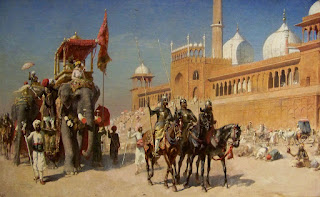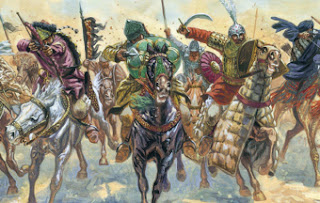As Eid ul Adha is approaching and we all know how auspicious it is for muslims, but being a young muslim growing up in India where muslims are in minority. I have been asked through out my life so far that, why muslims celebrate this eid, offer sacrifice ? Why they "KILL" innocent animals? its cruel etc.
I used to think that, why they only care about eid and not about 5 stars, kfc, mcdonalds and other religions sacrificing animals. And some of them are themselves non vegetarians so do they think that, their meat does't come from animals? or animals are not killed to provide meat for them? Anyways that is a different topic all together about choice of food.
So lets start, Eid ul Adha(Azha) is one of the only two muslim festivals that are prescribed by the Holy Quran. It is the biggest muslim festival and it has lots of significance. Like other muslim practices Eid is also related to charity. It encourages us to do charity, it motivates people to give alms to poor and particularly the meat to those who cant afford it or rarely afford it.
This all started some 4000 to 4500 thousand years ago where one of the mightiest messenger for muslims Prophet Abraham(Ibrahim) Pbuh was born. He is also an important figure in Christianity and Judaism. Islam, Christianity and Judaism are also called Abrahimic religions as most of the population of humans on earth adhere to these faiths.
So back again to the story, i am going to narrate it, as it was narrated to me by my father and to him his father, so some 4000 to 4500 thousand years ago Prophet Abraham (pbuh) had a dream in which he was asked to sacrifice his most beloved thing. In the morning he woke up and then that day he sacrificed some camels.
Next night he again had a dream and similar instructions were given to him to sacrifice his most beloved thing. Next morning he sacrificed some more number of camels than before thinking the god wants him to sacrifice more camels. Next night he had the same dream and again following morning he did the same and increased the number of camels. He thought finally he had done what he was ordered to.
But again that night he had the same dream and the following morning he was amused , confused that what is the most beloved and precious thing to him after thinking a while, he finally realized that his most precious thing is his son Ismail, In the Islam his son Ismail (pbuh) is also considered as prophet of Allah.
After realizing that, he become sad that how he is going to say this to his son and what he is going to respond? He would he think that his father has gone crazy and mad.
Suddenly his son came and asked, father! why you are so much tensed and worried ? Prophet Abraham told him about his dreams and what he was ordered to do and who is his most precious thing. After hearing the story Prophet Ismail (pbuh) instantly agreed and said we have to fulfill the the commandment of Allah.
That was a 'MIRACLE' both father and son filled with happiness and joy, How could Allah had allowed that, how could he had allowed a father to slaughter his son that too a prophet of god. And then Allah sent angel Gabriel to Prophet Abraham and he said, "you both have passed the test of Allah" and he has liked your obedience so much that he has ordered,' till the doomsday, the believers of Allah and those who believe in you and other messengers of god will sacrifice an animal according to their financial capabilities for him'. Your god doesn't want blood , meat , skin , he wants your obedience, he sees your intentions of what you have done for him and those who are around you.
In simple language it means what would you have done of the meat and hide of the animal that you have slaughtered like most of the practices of Islam, sacrifice of animals is also related to charity , It is prescribed for people to keep 1/3 of the meat for themselves and 1/3 for their relatives, neighbors, and 1/3 for poor but if you give more to the needy you will be blessed more and the significance of the Qurbani is to fulfill the commandment of Allah and do charity in the name of Allah.
Qurbani like Haj is only for those who can afford it and not compulsory for those who can not.
Qurbani teaches us to be humble to be charitable. Allah sees how a person raises an animal to which he loves or he purchased from his hard earned money and sacrifice it for the will of the god and distributes it to the poor, under privilege. People say god wants meat, blood but he doesn't he wants you to use them for your betterment and your kinds betterment.
This is my small attempt to tell people the story of the Eid and its significance.
Thank you for you time
Jazak ALLAH




